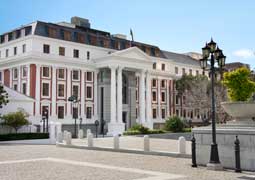
The African National Congress (ANC) Member of Parliament in the National Assembly (NA), Dr Nobuhle Nkabane, says the biggest threats to social cohesion and inclusion are inequality, poverty and unemployment.
She recently led a debate on the topic “Transforming society and uniting the country by cultivating a shared recommitment to constitutional values that promote nation-building, strengthen social cohesion and improve the quality of life for all South Africans.”
Dr Nkabane told a mini-plenary of the NA that studies reveal that South Africa was one of the most unequal societies in the world, and that the country remains divided along class, racial and ethnic lines.
She said there are shortcomings that are threats to the transformation of the society and nation-building that demand the government to employ an aggressive approach in addressing them.
She called on government to address inequality, poverty and unemployment, language barriers, cultural differences, historic borders, multicultural education curriculum, uncertainty about technological innovations versus the future of work, service delivery (unreliable water and electricity supply), the politics of land expropriation without compensation versus land grabs, property rights and constitutional amendments, overpopulation and the decline in the nation’s moral fibre and the debate on open border policy
“Linked to overpopulation is the increase in the number of foreign nationals entering South Africa (sitting at 14 million in 2012) which has a negative effect on what we call as “periodic xenophobic outburst against perceived non-citizens or acts of criminality”.
Dr Nkabane also mentioned what she termed “secondary threats” to social cohesion and nation-building and listed them as follows:
“South Africa has been the most unequal society in the world. Due to deep poverty and high unemployment, which affects close to a two-thirds of the population, the persistence of race and gender as determinants of inequality, poverty and unemployment, is the biggest threat to social cohesion and inclusion.
“Gender-based violence – the foundation of this is the system of patriarchy including its values and cultures where women and children are regarded as possessions of the patriarch. Despite the advances in recognising the rights of people with different sexual orientation and identities, South Africa has seen a rise in violence against LGBTQI persons.
“High levels of crime,” she added, “are an underlying malaise in the social and moral fabric of the South African society; and there has been a marked decline in respect for the authority of the state and the criminal justice system.
“The solution to all these challenges is to rethink the democratic agenda in a manner that makes actual meaning and impacts positively on the quality of the lives of South Africans, which looks holistically in all components of the democratic agenda which is political democracy, economic democracy (equal economic opportunities), social democracy, and land reforms.”
She further suggested that the scourge of unemployment can be addressed by rethinking, redesigning and redefining the future of work by looking holistically at the technological innovations versus the human factor and human intelligence – and by ensuring that all the transformative models and systems augment the contribution of the humans, rather than replacing humans.
Mr Michael Cardo of the official opposition (Democratic Alliance) accused the ruling ANC of “unstitching the fabric of our constitutional settlement”.
He said: “Instead of building the nation and sewing social cohesion, the ANC has chosen to unstitch the fabric of our constitutional settlement with its assault on property rights and by making promises on social justice that it will never fulfil. Let us respect dignity of South Africans by making sure they can find jobs, let us rebuild the nation by focusing on genuine non-racialism and non-sexism. And let us foster social cohesion by putting the Constitution before party.”
Mr Cardo said the Constitution is the social compact through which the new South Africa was created. “It is our own Magna Carta, a document offering promise and hope,” he said.
He said the ANC has had 25 years to unite the country behind a shared commitment to constitutional values that promote nation-building and social cohesion.
Participating in the debate, Economic Freedom Fighters (EFF) MP, Ms Yoliswa Yako, said it was only through “expropriation of land without compensation that we will transform South Africa and build one nation”. Instead, she said the ANC has squandered opportunity after another along the way.
“We cannot transform South Africa if we do not change poverty relations, we must create work for our people, only when people earn an income, participate in the economy and put a roof over their heads and their children’s, will we be able to recommit to the constitutional values and improve the lives of our people,” said Ms Yako.
By Sakhile Mokoena
2 March 2020

